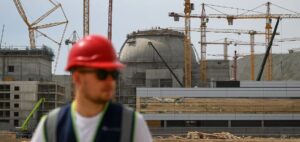Uganda’s energy minister on Tuesday described as “inappropriate” a European Parliament resolution against a planned oil megaproject with the French group TotalEnergies,
the European institution pointing out “human rights violations” against opponents.
In February, TotalEnergies announced a $10 billion investment agreement with Uganda, Tanzania and Chinese oil giant CNOOC for an oil megaproject that includes the construction of a pipeline of more than 1,400 kilometers linking the Lake Albert oilfields in
Western Uganda, on the Tanzanian side.
In a non-binding resolution, the European Parliament said it was “extremely concerned about human rights violations” in both countries, citing “arrests, intimidation and judicial harassment of human rights defenders and non-governmental organizations.
The intervention of the European Parliament is “inappropriate”, Ruth Nankabirwa, the Ugandan Minister of Energy, told AFP on the sidelines of the Green Energy Africa Summit in Cape Town, South Africa, saying that the authorities in Kampala were taken “by surprise”.
“We are all partners in the fight against climate change. If we don’t see ourselves as partners, we are not going to win this war,” Nankabirwa said.
On September 16, Ugandan President Yoweri Museveni indicated that the project “will continue as stipulated in the contract we have with TotalEnergies and CNOOC.
Africa is the continent that emits the least greenhouse gases, with only 3% of global emissions.
Under the waters and on the shores of Lake Albert, a natural barrier of 160 km separating Uganda from the Democratic Republic of Congo, lie the equivalent of 6.5 billion barrels of crude oil, of which about 1.4 billion barrels are recoverable in the current state of discovery.
Uganda’s reserves can last between 25 and 30 years with an estimated peak production of 230,000 barrels per day.
President Museveni, who has ruled Uganda with an iron fist since 1986, has praised the project in the past, citing in particular the economic benefits for this landlocked country where the majority of the population lives below the poverty line.





















